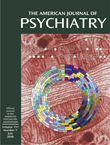N-Acetylaspartate Concentration in the Anterior Cingulate of Maltreated Children and Adolescents With PTSD
Abstract
OBJECTIVE: Anterior cingulate dysfunction has been implicated in the pathophysiology of posttraumatic stress disorder (PTSD). The authors hypothesized that integrity of the anterior cingulate may be affected in childhood PTSD.METHOD: Single voxel proton magnetic resonance spectroscopy (proton MRS) was used to measure the relative concentration of N-acetylaspartate and creatine, a marker of neural integrity, in the anterior cingulate of 11 children and adolescents who met DSM-IV criteria for PTSD secondary to maltreatment and 11 healthy matched comparison subjects.RESULTS: The ratio of N-acetylaspartate to creatine was significantly lower in the maltreated subjects with PTSD than in the comparison subjects.CONCLUSIONS: The lower N-acetylaspartate/creatine ratio in subjects with PTSD suggests that anterior cingulate neuronal metabolism may be altered in childhood PTSD.



